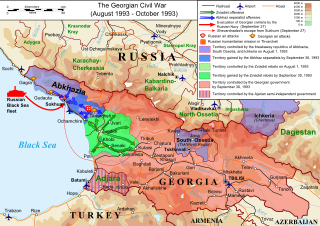
The Georgian Civil War lasted from 1991 to 1993 in the South Caucasian country of Georgia. It consisted of inter-ethnic and international conflicts in the regions of South Ossetia and Abkhazia, as well as the violent military coup d'état against the first democratically-elected President of Georgia, Zviad Gamsakhurdia, and his subsequent uprising in an attempt to regain power.
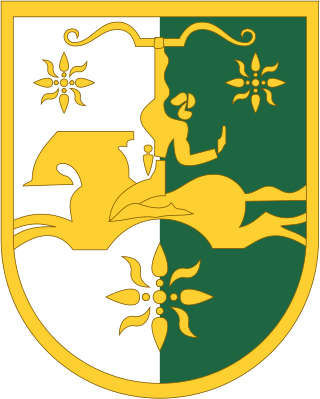
Politics in Abkhazia is dominated by its conflict with Georgia. Abkhazia became de facto independent from Georgia after the 1992–1993 war, but its de jure independence has only been recognised by a few other countries. Abkhazia is a presidential representative democratic republic with a multi-party system, wherein the President is both head of state and head of government. Executive power is exercised by the government of the Republic of Abkhazia. Legislative power is vested in both the government and the People's Assembly of Abkhazia.
The Kodori Valley, also known as the Kodori Gorge, is a river valley in Abkhazia, Georgia's breakaway autonomous republic. The valley's upper part, populated by Svans, was the only corner of the post-1993 Abkhazia directly controlled by the central Georgian government, which since 2006 officially styles the area as Upper Abkhazia. On August 12, 2008, Russo–Abkhazian forces gained control of the Upper Kodori Valley, previously controlled by Georgia.

The Abkhazia conflict is a territorial dispute over Abkhazia, a region on the eastern coast of the Black Sea in the South Caucasus, at the intersection of Eastern Europe and Western Asia. The conflict involves Georgia, Russian Federation and Russian-backed self-proclaimed Republic of Abkhazia, internationally recognised only by Russia, Venezuela, Nicaragua, Nauru, and Syria; Georgia and all other United Nations members consider Abkhazia a sovereign territory of Georgia. However, as of 2023, Georgia lacks de facto control over the territory.
The Sukhumi massacre took place on 27 September 1993, during and after the fall of Sukhumi into separatist hands in the course of the War in Abkhazia. It was perpetrated against Georgian civilians of Sukhumi, mainly by militia forces of Abkhaz separatists and North Caucasian allies. It became part of a violent ethnic cleansing campaign carried out by the separatists.

Emzar Kvitsiani is a former Georgian military commander and politician. He took part in the War in Abkhazia (1992–1993), forming a paramilitary group Monadire in the upper Kodori valley, guarding it from Abkhaz forces. He was mainly active in Kodori valley, which he ran de facto through his militia from 1992 to 2006. In 1999, President Eduard Shevardnadze appointed Kvitsiani to the post of President's special envoy to Kodori valley. In 2001, Kvitsiani allegedly cooperated with Chechen field commander Ruslan Gelayev in an attempt to bring Abkhazia back under Georgian control. Kvitsiani opposed the Rose Revolution, which subsequently led to confrontation with the Georgia's central authorities under Mikheil Saakashvili. President Sakaashvili removed him from his official government position in December 2004 and later disbanded the Monadire in April 2005. Kvitsiani declared defiance to the authorities in 2006 and was subsequently ousted by the Georgian government forces. He fled to North Caucasus, but, in 2014, he was arrested on his return to Georgia, initially sentenced to 16 years in jail, and then released under a plea bargain in early 2015. He was one of the leaders of the Alliance of Patriots of Georgia and a member of Parliament of Georgia.
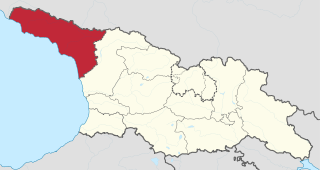
The Government of the Autonomous Republic of Abkhazia is an administration established by Georgia as the legal and only government of Abkhazia. Abkhazia has been de facto independent from Georgia – though with limited international recognition – since the early 1990s. Ruslan Abashidze, elected in May 2019, is the current head of the government-in-exile.
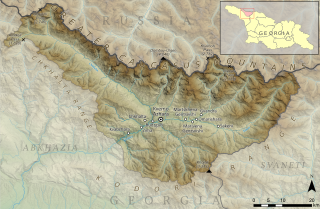
Upper Abkhazia, commonly known by its administrative name, Azhara Municipality is a geographical term and municipality of the Government of the Autonomous Republic of Abkhazia. The term was first introduced in 2006, to denote the northeastern part of the disputed territory of Abkhazia, that had remained under Georgian control after the 1992 War in Abkhazia. From September 2006 to August 2008 its main village, Chkhalta, hosted the Government of the Autonomous Republic of Abkhazia and was the seat of the Azhara municipal community. This situation came to an end in the Battle of the Kodori Valley in August 2008, when Upper Abkhazia was conquered by the Russo-Abkhazia armies, which had already controlled the rest of Abkhazia. Even though the area was no longer controlled by Georgia, the Georgian Government kept its municipal status as a sign of not recognizing any changes to the Abkhazian administrative divisions made by the breakaway republic. The current seat of the municipal government-in-exile is Tbilisi.
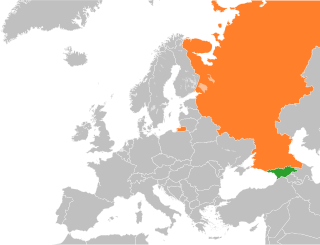
Russia and Georgia have had relations for centuries. The contacts between the two date back to the 15th and 16th centuries, and the most important stage started in the 1580s, when the Georgian kingdom of Kakheti and the Russian Empire signed a treaty of alliance in 1587. Since then, Georgia–Russia relations have been developing vibrantly and culminated in the Treaty of Georgievsk, which established eastern Georgia as a protectorate of Russia. At that time, Georgia saw Russia as a powerful Christian and modernizing neighbor, capable of protecting Georgia from invading Muslim empires and North Caucasian raiders.

The history of Abkhazia, a region in the South Caucasus, spans more than 5,000 years from its settlement by the lower-paleolithic hunter-gatherers to its present status as a partially recognized state.
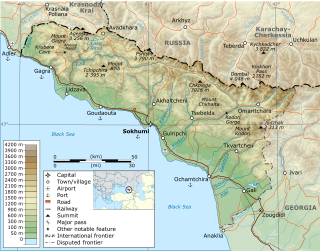
The War in Abkhazia was fought between Georgian government forces for the most part and Abkhaz separatist forces, Russian government armed forces and North Caucasian militants between 1992 and 1993. Ethnic Georgians who lived in Abkhazia fought largely on the side of Georgian government forces. Ethnic Armenians and Russians within Abkhazia's population largely supported the Abkhazians and many fought on their side. The separatists received support from thousands of North Caucasus and Cossack militants and from the Russian Federation forces stationed in and near Abkhazia.

The Battle of Gagra was fought between Georgian forces and the Abkhaz secessionists aided by the Confederation of Mountain Peoples of the Caucasus (CMPC) militants from 1 to 6 October 1992, during the War in Abkhazia. The allies, commanded by the Chechen warlord Shamil Basayev, captured the town of Gagra from the undermanned Georgian forces in a surprise attack, leading to an outbreak of ethnic cleansing of local Georgian population. The battle proved to be one of the bloodiest in the war and is widely considered to be a turning point in the Georgian-Abkhaz conflict. The action, in which Russian commanders were suspected to have aided to the attackers, also resulted in a significant deterioration of the Georgian-Russian relations.
The 2007 Bokhundjara incident refers to a skirmish that occurred between Georgia and its breakaway republic of Abkhazia near the border with Georgia proper in Abkhazia Tkvarcheli District on September 20, 2007, between Georgian Interior Ministry commandos and Abkhaz forces. The United Nations Observer Mission in Georgia (UNOMIG) launched an independent investigation of the incident. On October 11, 2007, it released a progress report, confirming the incident took place on Abkhaz-controlled territory at the foot of Mount Bokhundjara, thus confirming the Abkhaz version of the event. On October 27, 2007, Georgia released the arrested Abkhazians and handed them over to the U.N. observers as a "sign of good will."
An international diplomatic crisis between Georgia and Russia began in 2008, when Russia announced that it would no longer participate in the Commonwealth of Independent States economic sanctions imposed on Abkhazia in 1996 and established direct relations with the separatist authorities in Abkhazia and South Ossetia. The crisis was linked to the push for Georgia to receive a NATO Membership Action Plan and, indirectly, the unilateral declaration of independence by Kosovo.

The Battle of the Kodori Valley was a military operation during the Russo-Georgian War in the Upper Kodori Valley of Abkhazia, a breakaway region of Georgia. It was the only part of Abkhazia under Georgian control before this military conflict. On 9 August 2008, the Abkhaz military, with support by Russian forces, launched an operation to remove the remaining Georgian troops from the disputed gorge. After three days, the Georgian military left the Upper Kodori Valley.

This article describes the background of the Russo-Georgian War.

Abkhazia, officially the Republic of Abkhazia, is a partially recognised state in the South Caucasus, on the eastern coast of the Black Sea, at the intersection of Eastern Europe and Western Asia. It covers 8,665 square kilometres (3,346 sq mi) and has a population of around 245,000. Its capital and largest city is Sukhumi.

Gali District is one of the districts of Abkhazia, Georgia. Its capital is Gali, the town by the same name. The district is smaller than the eponymous one in the de jure subdivision of Georgia, as some of its former territory is now part of Tkvarcheli District, formed by de facto Abkhaz authorities in 1995.
The War in Abkhazia from 1992 to 1993 was waged chiefly between Georgian government forces on one side, Russian military forces on other side supporting separatist forces demanding independence of Abkhazia from Georgia. http://www.historyorb.com/russia/georgia.php Ethnic Georgians, who lived in Abkhazia fought largely on the side of Georgian government forces. Ethnic Armenians and Russians within Abkhazia's population, largely supported Abkhazians and many fought on their side. The separatists were supported by thousands of the North Caucasus and Cossack militants and by the Russian Federation forces stationed in and near Abkhazia.
Monadire was an armed formation and a militia initially created by Emzar Kvitsiani within Upper Abkhazia. The militia consisted of ethnic Svans living within the Kodori Valley. The Georgian authorities held control over the valley largely thanks to the militia, until its dissolution in 2006.















